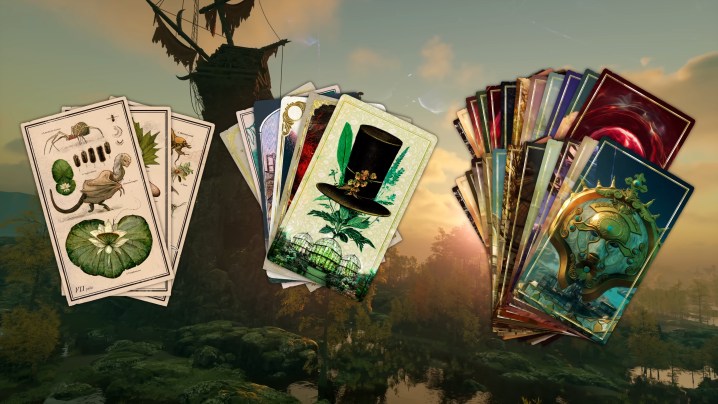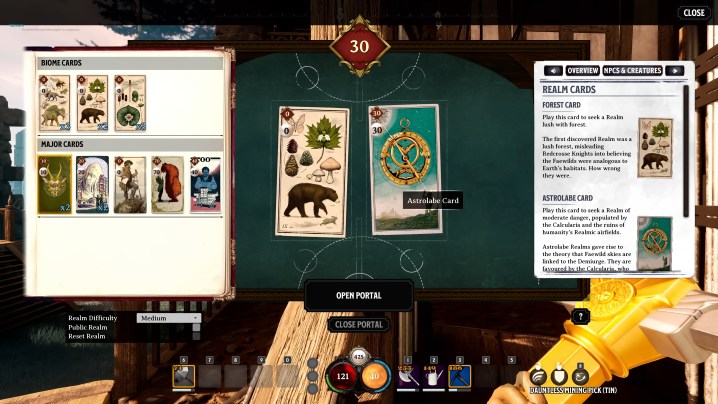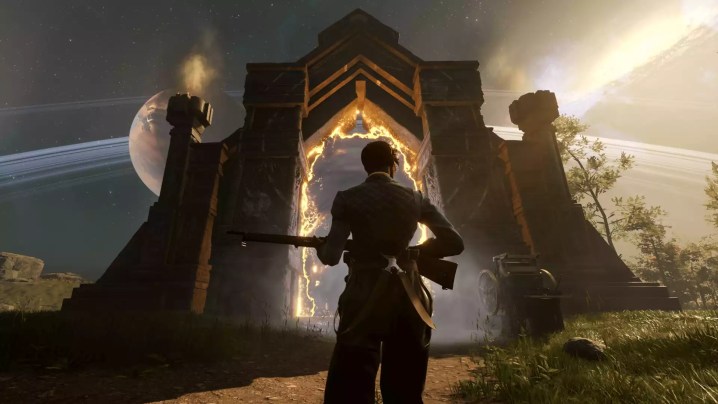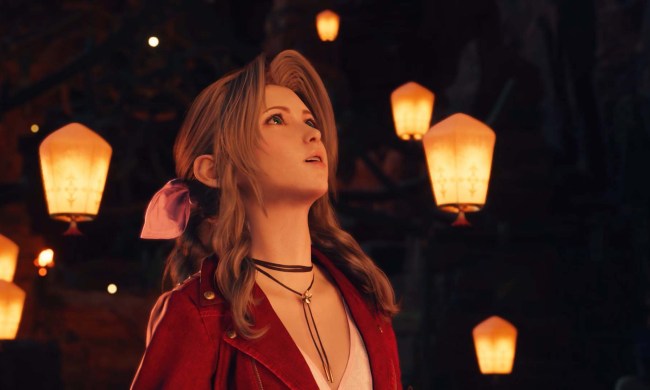
In most survival crafting games, there’s one large world filled with multiple biomes for players to explore. That’s not the case with Nightingale. While there are procedurally generated realms to explore, players are the ones who craft them with an innovative Realm Card system. Anytime players feel like they’ve amply explored the realm they are in or feel like they need to go to a new one to gather resources, a portal must be found or built.
To activate it, players choose cards that set the parameter the next generated realm will follow. Once they step through the portal, they’ll find a world that feels unique. The beauty of this system is that it makes the player feel like they have more control over their experience without completely forgoing procedural generation. I spoke to some developers at Inflexion Games to learn just how this gameplay system came together.
Dealt the right hand
Once players are in the bulk of Nightingale’s gameplay loop, they’ll understand how the Realm Card system works. Players earn Realm Cards through exploration, quests, and general progression, and they must choose a biome card and a major card to create a new realm at a portal. Biome cards set the kind of world it will be — Forest, Desert, or Swamp — while Major Cards set the main theme and types of encounters in that realm, like Fae gardens or ruins.
From there, Nightingale’s procedural generation takes over and creates a new realm under those parameters. To shake things up further, minor cards can be played at Realmic Transmuters found throughout a generated realm, often at the end of various towers or combat encounters. Minor cards add further modifiers, like lowering the gravity, making certain resources more plentiful, and forcing certain survival game mechanics like hunger or stamina to drain slower.

Although their modifiers can’t be stacked, players can change what minor cards they are playing at a Realmic Transmuter to modify the game world on the fly. It’s a clever system that lets players take an active role in shaping the experience. According to Inflexion’s Head of Production, Leah Summers, the idea for this system came about early on in the project.
“It fit with the idea that we wanted players to have unprecedented agency over the world,” Summers tells Digital Trends. “One of the conceits that fit really well with Neil’s art direction was the idea of cards. We had lots of card art and interesting card motifs through the UI and whatnot. What if we had these cards control all these different parameters, adjust gameplay, and help players explore the world in a way that’s both unique from other people’s play experiences? That’s something we cemented very early on.”
The Realm Card system feels like the centerpiece of Nightingale’s design and helps it stand out the most in a sea of successful survival crafting games. Its influence permeates throughout parts of the game other than realm creation. Much like the Memory Shards system in Prince of Persia: The Lost Crown, the developer grounded this feature within Nightingale’s world.
The whole premise of the game is that players are Realmwaker, creating pathways to and exploring a lot of different realms as part of the search for the city of Nightingale after a portal network collapse. The Realm Card system emboldens that feeling that you’re journeying into the unknown, creating an unusual card combination and seeing the results. That makes sense, as Director of Art Neil Thompson tells Digital Trends that Realm Cards, and much of Nightingale’s concept art, are “a love letter to art history.”
Playing their cards
Although Inflexion had a relatively firm idea of what it wanted the Realm Card system to work like early on, that doesn’t mean it didn’t evolve a lot throughout development, with Thomspon outright admitting that players would “be shocked at how late some of the functionality came in” as playtesting feedback came back and Inflexion gained a better understanding of what players wanted and needed from the system.

Summers says the biggest challenges were solving the technical hurdles of getting this system to work with procedural generation and making the system make sense within the broader scope of player and narrative progression. Those tasks become even more daunting when you account for the fact that these generated Realms also have to work in multiplayer.
The salves for these issues were allowing players to choose and change Minor cards active at any time at Realmic Transmuters rather than at realm creation, and making Nightingale always online with servers paid for by developers so the realmwalking experience felt as unobtrusive as possible. That last decision ended up being the most controversial one.
Because Inflexion decided to make Nightingale always online so players could easily connect their created worlds, even those playing solo are negatively impacted by any server issues, poor Internet connections, and the bevy of other problems that can come with online games. A large portion of Nightingale’s community has spoken out against the decision, and Inflexion is now working on an offline mode. That doesn’t take away from the innovative nature of Realm Cards, though, especially if the system can make the transition to offline play well.
Inflexion sees Realm Cards as a place to expand Nightingale’s post-launch content offerings once top priorities like offline play are out of the way. In a presentation Digital Trends attended prior to launch, Inflexion CEO Aaryn Flynn teased that more biome, major, and minor Realm Cards are in the works for Nightingale and that the team is considering features that would let players stack multiple minor cards in one Realm or give certain “card sets” extra bonuses when used together.

Card games and survival crafting games have been popular for years, so it’s encouraging to finally see a studio tackle the off-the-wall idea of combining the two and do so to great success. Thompson sees that innovative spirit as coming from a team aligned on vision and includes emerging creatives willing to push boundaries.
“It has been that blend of experience in leadership positions and then youthful enthusiasm, optimism, and no challenges like ‘you can’t do that because it has never been done.’ People come to this with the mindset of ‘What can we do?” and ‘How far can we push these ideas?’ You see that in the game with things like the application of Realm Cards, particularly the minor realm cards, which I think are mind-blowing. Those are the sorts of things that, perhaps if it was a group of tired old developers, they may never have happened.”
Well, I’m glad they did happen. Nightingale is available now in early access on PC.



